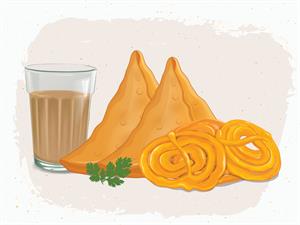PDF chapter test TRY NOW
She took me into the station dining-room, ordered tea and samosas and jalebies, and at once I began to thaw and take a new interest in this kind woman. The strange encounter had little effect on my appetite. I was a hungry school boy, and I ate as much as I could in as polite a manner as possible. She took obvious pleasure in watching me eat, and I think it was the food that strengthened the bond between us and cemented our friendship, for under the influence of the tea and sweets I began to talk quite freely, and told her about my school, my friends, my likes and dislikes. She questioned me quietly from time to time, but preferred listening; she drew me out very well, and I had soon forgotten that we were strangers. But she did not ask me about my family or where I lived, and I did not ask her where she lived. I accepted her for what she had been to me — a quiet, kind and gentlewoman who gave sweets to a lonely boy on a railway platform...
Explanation:
The woman took the boy to a dining-room that was inside the railway station. She ordered tea, jalebies, and samosas for him.

Tea, samosas and jalebies
After that, the boy became more friendly or developed a new interest in that woman. His appetite increased after seeing the food. He was starving because he hadn't eaten anything for a long time. He ate as much as he could because he was a hungry schoolboy (the hungry school boy refers to the one who was young and can eat only a certain amount of food). He ate politely and with table manners.
The woman looked at him gently the way a mother looks after her child while he/she was eating food. The boy thought that their friendship developed because of tea and sweets. When he first met the woman, he was too shy to approach her. Later, when she treated him well, he began to speak freely to her. He told her about his school, his friends, and what he likes and dislikes. The woman asked a few questions in between, but she was mostly a good listener. She was focused entirely on the boy and was not hesitating to hear what he had to say. He was influenced by the way she treated him.
While talking with the boy, the woman never asked him about his family and his living place. Likewise, the boy also never bothered about the same thing. He accepted her as a good friend because of the way she treated him. The boy thought that the woman was kind and gentle because she offered food to the lonely and hungry boy on a busy platform.
The woman looked at him gently the way a mother looks after her child while he/she was eating food. The boy thought that their friendship developed because of tea and sweets. When he first met the woman, he was too shy to approach her. Later, when she treated him well, he began to speak freely to her. He told her about his school, his friends, and what he likes and dislikes. The woman asked a few questions in between, but she was mostly a good listener. She was focused entirely on the boy and was not hesitating to hear what he had to say. He was influenced by the way she treated him.
While talking with the boy, the woman never asked him about his family and his living place. Likewise, the boy also never bothered about the same thing. He accepted her as a good friend because of the way she treated him. The boy thought that the woman was kind and gentle because she offered food to the lonely and hungry boy on a busy platform.
Meanings of the difficult words:
| S.No | Words | Meanings |
1 | Samosas | A triangular savoury pastry fried in ghee or oil, containing spiced vegetables or meat |
2 | Jalebies | An Indian sweet made of a coil of batter, fried and steeped in syrup |
3 | Appetite | Desire to eat |
4 | Pleasure | A feeling of enjoyment |
5 | Stranger | Unknown person |
6 | Gentlewoman | A woman with good manners and high standards of behaviour |
7 | Encounter | Brief meeting |
Reference:
State Council of Educational Research and Training (2019). Term-3 English Standard-8. The Woman on Platform 8 - Ruskin Bond (pp. 107-114). Published by the Tamil Nadu Textbook and Educational Services Corporation.
